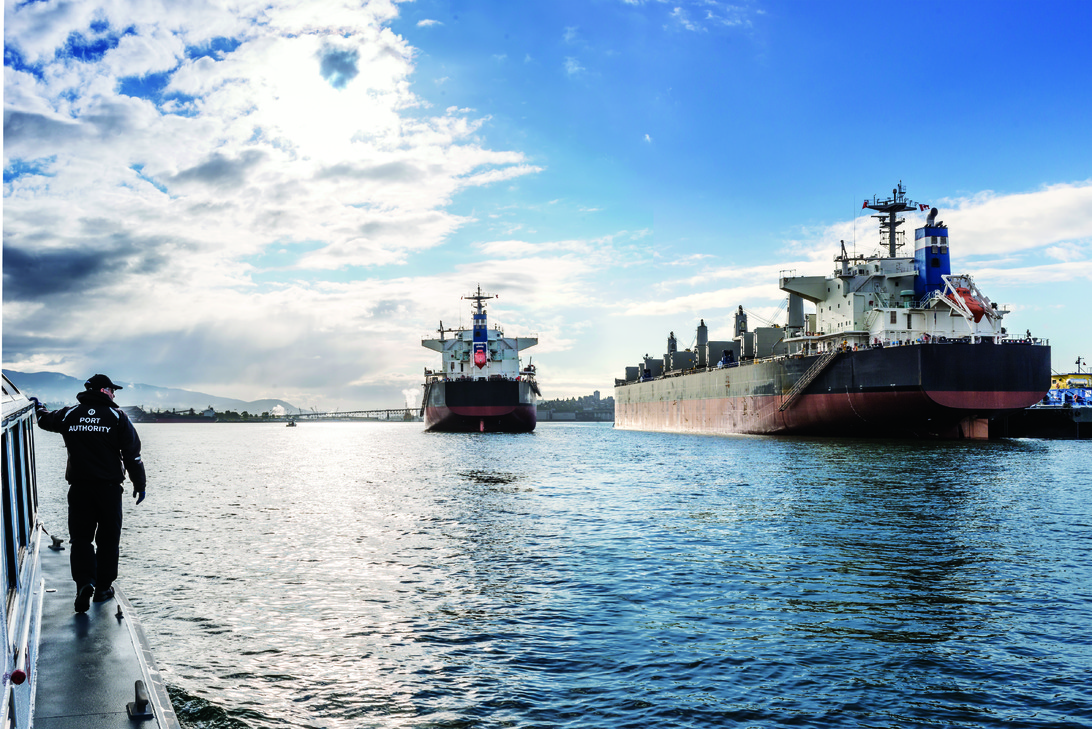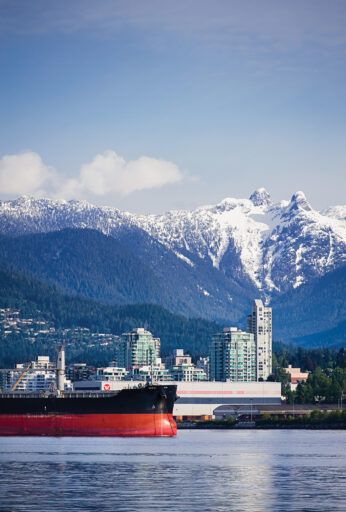Port of Vancouver

Located on the southwest coast of British Columbia, Canada, the Port of Vancouver extends from Roberts Bank and the Fraser River up to and including Burrard Inlet. Geographically, the Port of Vancouver includes more than 16,000 hectares of water, more than 1,500 hectares of land and hundreds of kilometres of shoreline, bordering 16 municipalities and intersecting the traditional territories and treaty lands of several Coast Salish First Nations.
The Port of Vancouver is Canada’s largest port, home to 29 major terminals, and is able to handle the most diversified range of cargo in North America: bulk, containers, breakbulk, liquid bulk, automobiles and cruise. As a gateway to over 170 trading economies around the world, the port handles $1 of every $3 of Canada’s trade in goods outside of North America. Enabling the trade of approximately $240 billion in goods, port activities sustain 115,300 jobs, $7 billion in wages, and $11.9 billion in GDP across Canada.
The Vancouver Fraser Port Authority is the federal agency responsible for the stewardship of the lands and waters that make up the Port of Vancouver. As a Canada Port Authority, our mandate is to enable Canada’s trade through the port, while protecting the environment and considering local communities.
Our mission is to enable Canada’s trade objectives, ensuring safety, environmental protection and consideration for local communities.
Our vision is for the Port of Vancouver to be the world’s most sustainable port.

A sustainable port delivers economic prosperity through trade, maintains a healthy environment, and enables thriving communities through collective accountability, meaningful dialogue and shared aspirations. Learn more about our approach to sustainability (https://www.portvancouver.com/about-us/sustainability/).
Our approach to reducing emissions from ships includes supporting regulations, such as the International Maritime Organization North American Emission Control Area, providing incentives for positive environmental practices, and supporting the use of shore power and cleaner fuels. Our EcoAction Program, launched in 2007, offers discounts on harbour dues to vessels meeting voluntary environmental best practices that reduce emissions, underwater noise and other environmental impacts. These practices include obtaining third-party environmental designations and using cleaner fuels, such as LNG, and other technologies. For more information on our EcoAction Program reference our program summary sheet (https://www.portvancouver.com/wp-content/uploads/2020/01/2020-01-15-Reference-sheet-EcoAction-Program-2020.pdf)
In the spirt of collaboration and recognizing that air emissions readily cross regional and national boundaries, we work collaboratively with other major ports and government agencies to address air emissions. At the regional level, through the Northwest Ports Clean Air Strategy, we partner with the ports of Seattle and Tacoma and the Northwest Seaport Alliance to reduce port-related air emissions in the shared Georgia Basin-Puget Sound air shed. This shared strategy benefits from active input from Environment and Climate Change Canada, Metro Vancouver, the Puget Sound Clean Air Agency, the Washington State Department of Ecology, and the U.S. Environmental Protection Agency.
At the global level, the maritime industry is exploring alternative fuels, such as Liquefied Natural Gas (LNG), in response to the International Maritime Organization (IMO) 2020 global fuel sulphur limits and the existing North American Emission Control Area. Natural gas is expected to be adopted by shipping lines, across several sectors (i.e. container, cruise, auto carrier, regional tanker), that call to the Port of Vancouver in the near term (early 2020’s), and as such LNG bunkering will be a new type of activity and service that the port will need to accommodate. In order to prepare the port for LNG Bunkering, a range of studies are underway to fully understand the risks, costs, and benefits, and to ensure that appropriate policies and procedures are in place. In order to successful implement LNG Bunkering, the port is working with service providers, industry, government, technical bodies, and academic partners to facilitate a smooth transition to cleaner marine fuels.
For more information:
Website: https://www.portvancouver.com/
Contacts:
Ronan Chester, Manager, Strategic Environmental Initiatives
e-mail: Ronan.Chester@portvancouver.com
Gary Olszewski, Environmental Specialist
e-mail: Gary.Olszewski@portvancouver.com
